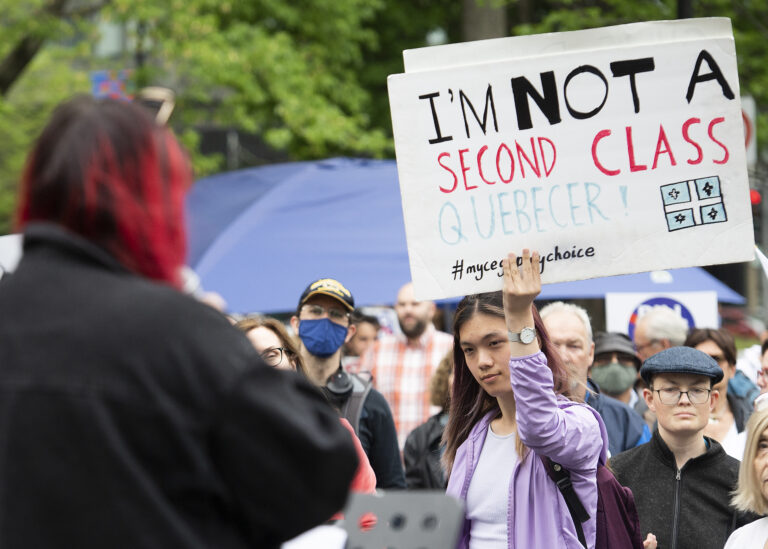Five years ago, Canadian lawyer Barry Bussey took stock of his country’s political and legal trends and issued a dire warning to all religious organizations. In his essay Making Registered Charitable Status of Religious Organizations Subject to ‘Charter Values’, Bussey explained that the standing of churches as respected charitable institutions was about to come under attack – a result of the inherent conflict between “politically incorrect” religious doctrine and the concept of equality found in human rights legislation. It was not a question of whether such a challenge might occur, he warned, “it is a matter of when, and preparing for the inevitable.” It didn’t take long for Bussey’s prediction to come true.
Late last year, the House of Commons’ Standing Committee on Finance produced its annual list of pre-budget recommendations to Parliament. As usual, it summarized the pleadings of various businesses, organizations and lobby groups to the Liberal-dominated committee seeking favourable new government programs, tax breaks and other fiscal goodies. This time around, however, an item calling for the end of a long-standing tax benefit made its surprising first appearance.
Tucked amongst the 460 recommendations was one calling for the next federal budget to “Amend the Income Tax Act to provide a definition of a charity which would remove the privileged status of ‘advancement of religion’ as a charitable purpose.” Following through on Recommendation #430 would mean that all churches would henceforth be taxed as if they were businesses, while losing their authority to issue tax receipts to donors.
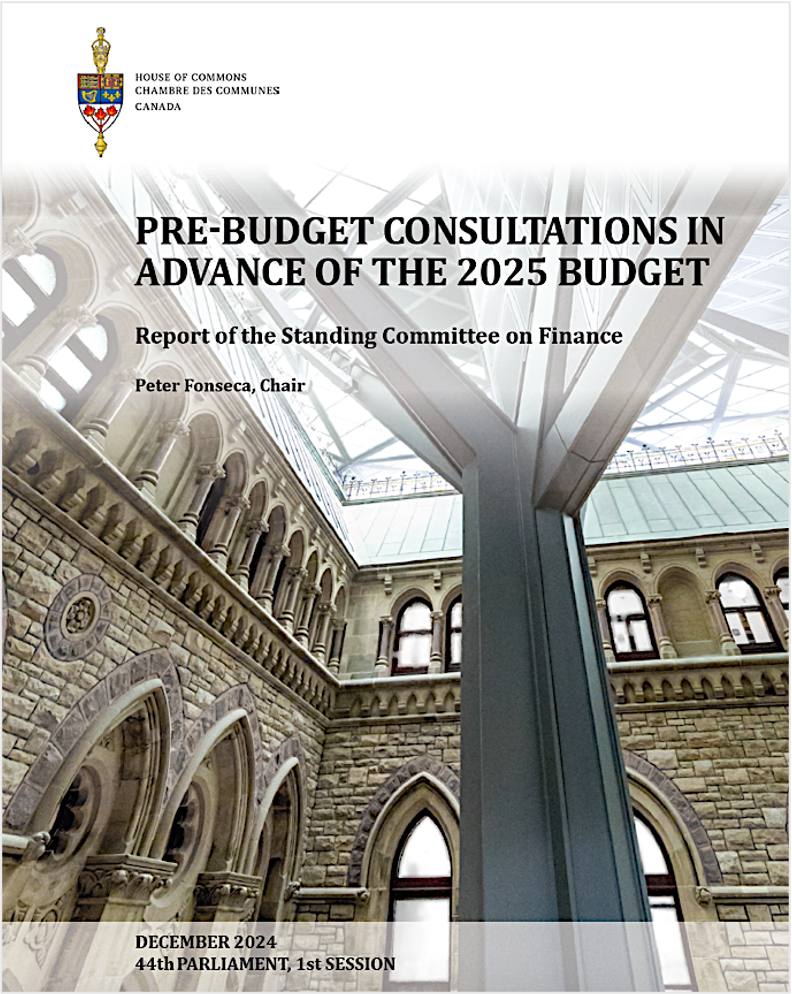
Despite its unheralded position in the committee’s report, Recommendation #430 should be regarded as an historic, epoch-ending proposal. Canada’s churches are already reeling from decades of declining membership. Making religious organizations subject to the full measure of Canada’s tax system would undoubtedly impose a devastating additional burden. But the broader implications of such a change should trouble all civic-minded Canadians: religious, atheist or indifferent.
Beyond adding to churches’ present-day woes, the current tax proposal would end the centuries-spanning legal recognition of churches as community-building, welfare-enhancing institutions. Ample research establishes that churches and the volunteer spirit that animates them provide an array of benefits to the entire country. This includes the direct financial gain accruing to the local economy as well as the private provision of numerous local social welfare programs, and the general uplift created by the presence of a group of citizens committed to the physical and moral improvement of their community. Set against these society-wide advantages would be a tiny gain to government coffers resulting from the elimination of some modest tax breaks.
Whether the current Liberal government has accepted this radical advice won’t be known until the 2025 federal budget is finally released on November 4. According to The Catholic Register newspaper, Liberal MP Karina Gould last week stated that, “Charitable status for religious organizations is not under review.” But the fact this concept has already been blessed by the Liberal and NDP MPs who control the powerful Finance Committee, whose parties also comprise a majority in the House of Commons, suggests the idea holds considerable weight in Ottawa.
It should also be noted that the committee’s Conservative MPs responded to Recommendation #430 by organizing a petition objecting to it. “Religious organizations do good work advancing the common good, in Canada and beyond, and rely on charitable status to support their good work through private donations,” the petition reads. “We…call on the Canadian government to reject the absurd mean-spirited attack on religious organizations.”
That “good work” deserves a closer look.
Helping Poore Maides
Since the dawn of civilization, religious institutions have formed a crucial part of the polity – sometimes in competition with whatever form of government exists at the time. Consider the Medieval cathedral, that era’s most enduring form of architecture and one that embodied the latest developments in science and engineering. These were obviously grand religious structures meant to provide parishioners with a sense of awe as they worshipped. But their grounds were also places where anyone could socialize, seek shelter, organize and do business beyond the control of government authorities. As historian Phillip Ball explains in his 2008 book Universe of Stone: Chartres Cathedral and the Invention of the Gothic, local wine merchants sold their wares inside the church free from the taxes imposed elsewhere by the local nobility.
Canada, it should be noted, was founded on explicitly religious, Christian grounds. Our national motto, ‘A Mari Usque Ad Mare’ – From Sea to Sea – is a direct reference to Psalm 72:8. ‘O Canada’ asks that ‘God keep our land glorious and free.’
For centuries, churches provided sanctuary for those unjustly persecuted by absolutist governments. The first universities were religious efforts. So were the first hospitals. Prior to the creation of the modern welfare state, the poor, disabled, diseased or homeless searching for succour had nowhere to go but to their local church. When government was incapable or unwilling – which was almost always – the church was there to meet the need.
These obvious public benefits were first legally recognized in English law during the reign of Queen Elizabeth I. The Statute of Charitable Uses, passed by Parliament in 1601, enumerates (in archaic English) the many ways in which churches and other charities helped out, including, “Releife of aged, impotent and poore people…sicke and maymed Souldiers and Marriners…Orphans [and]…poore Maides.” Another law enacted the same year obliged local parishes to help the unemployed.
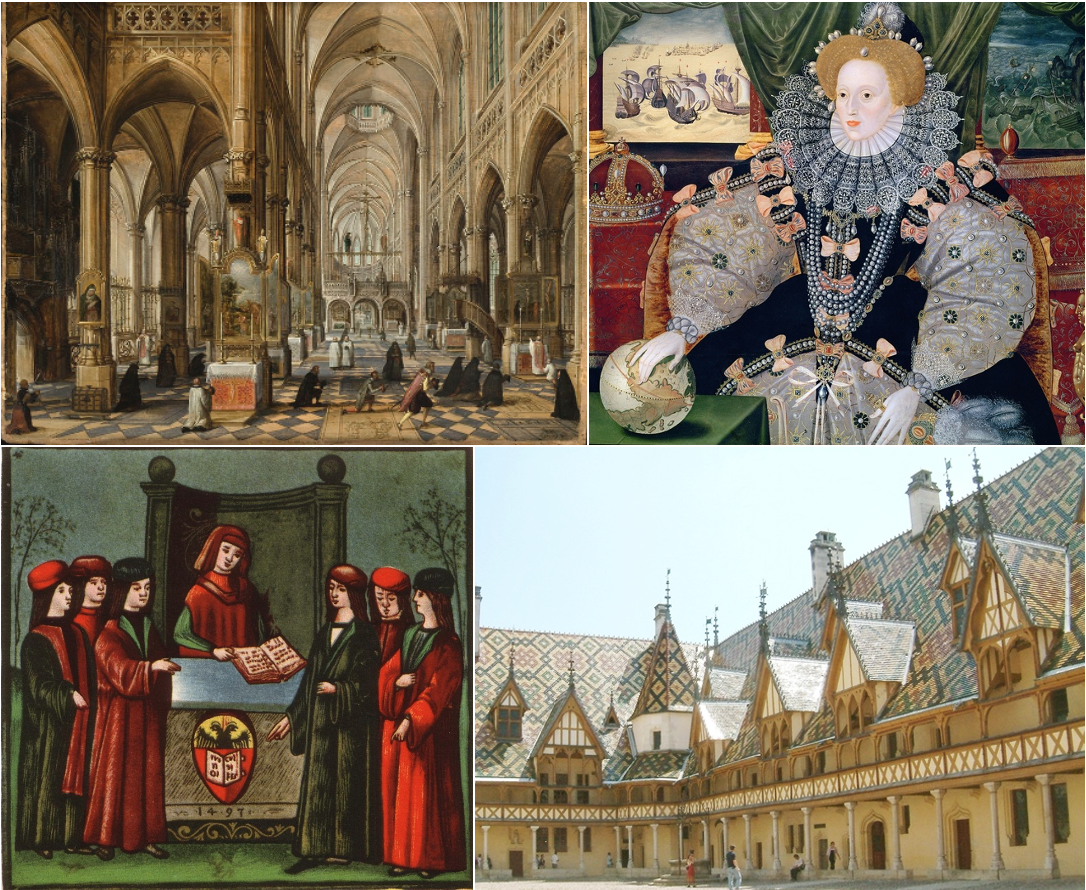 Good work, done free: For centuries churches have served the less fortunate while pioneering developments in science, architecture and education. Shown (clockwise from top left): Interior of a Gothic Cathedral by Dutch painter Paul Vredeman de Vries; Queen Elizabeth I, during whose reign the charitable work of churches was first legally recognized; the Hospices of Beaune, an early French hospital run by Les sœurs hospitalières de Beaune; students enrolling at the University of Bologna, the world’s oldest continuously-operating university, founded by the Catholic Church in 1088. (Source of bottom right photo: Cristophe Finot, licensed under CC BY-SA 2.5)
Good work, done free: For centuries churches have served the less fortunate while pioneering developments in science, architecture and education. Shown (clockwise from top left): Interior of a Gothic Cathedral by Dutch painter Paul Vredeman de Vries; Queen Elizabeth I, during whose reign the charitable work of churches was first legally recognized; the Hospices of Beaune, an early French hospital run by Les sœurs hospitalières de Beaune; students enrolling at the University of Bologna, the world’s oldest continuously-operating university, founded by the Catholic Church in 1088. (Source of bottom right photo: Cristophe Finot, licensed under CC BY-SA 2.5)The acceptance by government of the public significance of religious activity is now incorporated into Canada’s tax laws. Alongside the relief of poverty, advancement of education and other community-minded activities such as protecting the environment and supporting the arts, “advancement of religion” is explicitly recognized by the federal government as a pursuit deserving of charitable status. This means churches are exempt from paying income taxes and collecting GST/HST, while also being authorized to issue tax receipts to donors. Provincial tax codes similarly shield churches from property taxes. The general downturn in church attendance today means that these financial advantages are likely crucial to the continued existence of many religious institutions.
What is the “advancement of religion” and why is it significant for Canadian charities?
The Modern Church and its Good Works
Canada, it should be noted, was founded on explicitly religious, Christian grounds. Our national motto, A Mari Usque Ad Mare – From Sea to Sea – is a direct reference to Psalm 72:8. O Canada asks that “God keep our land glorious and free.” And the Canadian Charter of Rights and Freedoms begins, “Whereas Canada is founded upon principles that recognize the supremacy of God…”
This religious foundation appears to be rapidly slipping away, however. According to Statistics Canada’s 2021 Census, more than one-third of Canadians report having no religious affiliation whatsoever, a figure that had doubled since 2001. Between 2018 and 2023, there was a 37 percent drop in the number of Canadians who said they regularly participated in organized religion. With this decline in church membership has also come an overall decline in religious fundraising. In its most recent review of the volunteer and charitable sector, Statcan found that between 2018 and 2023 the total value of donations to churches and religious charities fell by 22 percent.

Despite these tough times, churches and religious institutions are still the biggest component of Canada’s charitable sector, accounting for $4.9 billion in annual donations. Behind them come health charities at $1.8 billion and social services at $1.7 billion. The church may be fading as a motive force in Canadian life, but it maintains a substantial presence in the provision of social services.
Consider Toronto’s downtown “Street Patrol”. On Wednesday evenings in July and August, parishioners from St. Patrick’s Roman Catholic Church and other parishes take to the streets with bags of sandwiches and drinks to share with hundreds of local homeless men and women. This volunteer organization began in 1995 when Lucio Abbruzzese came across a man dying on a Toronto sidewalk and wondered whether he could have done something more than just call 9/11. “I was doing everything I thought I should do as a Catholic – going to Mass, going to confession,” he explained to The Catholic Register in a recent interview. “But there was still something missing.”

What was missing, Abbruzzese realized, was serving the less fortunate in his own community. And so he founded Street Patrol, which has been coming to the aid of the city’s needy for the past 30 years. “The spirit of Street Patrol,” Abbruzzese explained to the paper, “is not just about the food, it’s more about actually talking with the homeless. The food lets us in.”
His program is just one of innumerable efforts organized by congregations of all faiths across the country and born of a desire to help their local community in ways government can’t or won’t. These include putting on Thanksgiving dinners, sponsoring refugees from Syria or Ukraine, organizing clothing and furniture drives, giving away Christmas baskets, providing temporary homeless shelters, hosting language schools and addiction programs and simply providing a safe and welcoming place for people in the surrounding neighbourhood to meet.
And while it is the doctrine of most religions not to ask for anything in return, it’s worth noting the sort of response most churches get for their efforts at making the world a better place. Not thanks, but scorn.
Is Mass Just Brunch with Less Food?
In 2016, American comedian Bill Maher reflected on the spiritual Zeitgeist on his HBO show Real Time with Bill Maher. Citing statistics that nearly 25 percent of Americans were “atheists, agnostics, and anti-religionists,” Maher opined: “That means almost a quarter of us in America are being forced to subsidize a myth that we’re not buying into. Why am I subsidizing their Sunday morning hobby?” Maher’s demand that churches be stripped of their charitable status has since grown in popularity.
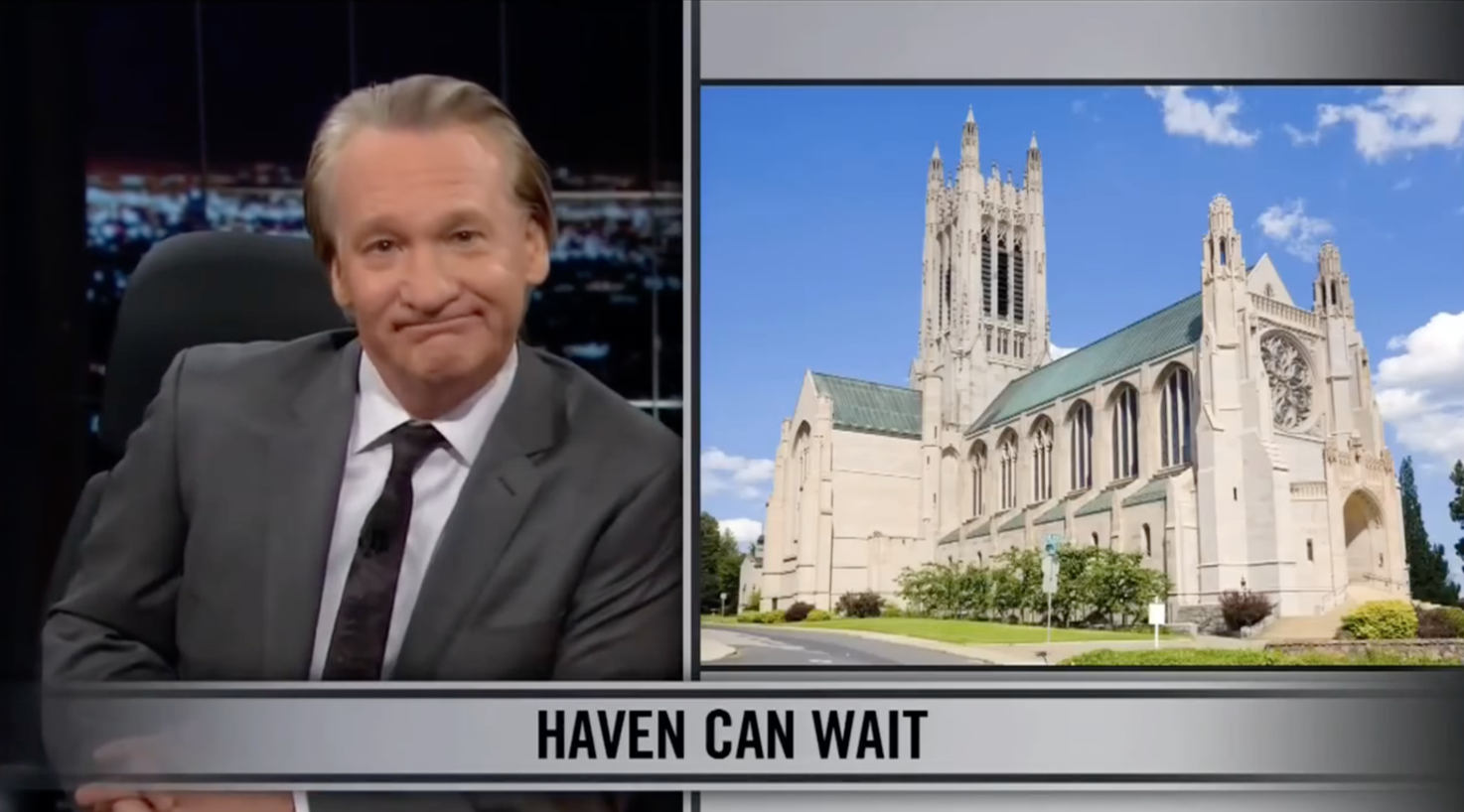
Thomas Dowd, the Roman Catholic Bishop of Sault Ste. Marie, Ontario, has been tracking the growth of anti-church sentiment closely. As Dowd relays in an interview with C2C Journal, a Quebec mayor once explained to him why churches ought to pay property tax. According to Dowd, the mayor asserted there is no difference between going out to a restaurant for breakfast and going to church on a Sunday morning. “If religion is your chosen form of entertainment, go to church,” Dowd recalls the mayor stating. “Some people go to brunch instead of church, some people go to the movies instead of Saturday night mass. But those other institutions all pay taxes. Why should the restaurant pay taxes and the church not?” In the public mind, Dowd worries, there has been a “privatization of religion.” Religious practice is now understood to be “a purely private activity versus an activity that produces public benefit.”
The concept is now becoming reality. The 2025 Pelchat-Rousseau Report to the Quebec government was commissioned to come up with ideas on how to push secularism even further in an already very secular province. Among its recommendations is that “removing the criterion of ‘promotion of religion’ would ensure greater consistency with the principle of separation of church and state.” The report also suggested assessing the administrative costs and impact on taxpayers of changing charity law. In 2022, the Nunavut city of Iqaluit passed a bylaw requiring that all churches pay property tax. Nunavut MP Lori Idlout defended the decision by suggesting that churches were both a drag on the economy and tainted by history. “It’s not fair to the rest of the municipality to have to carry the burden of a faith-based group – that itself is part of the history of colonialism,” she told Global News.
What social benefits do religious organizations provide to their communities?
Religious orders created the first universities and hospitals. Historically, churches have met the needs of the poor, disabled, and diseased when government was unable or unwilling. This volunteer spirit continues today in numerous ways. Toronto’s “Street Patrol” sees parishioners from St. Patrick’s Roman Catholic Church and other downtown churches provide food, drinks and conversation to hundreds of homeless individuals. Other common church efforts include sponsoring refugees, organizing clothing and furniture drives, providing temporary homeless shelters, hosting addiction programs and language schools, and offering a safe place for people in the neighbourhood to meet. Research from Statistics Canada shows that the country’s top volunteers are most likely to be actively religious, and that these volunteers “provided the majority of their hours to non-religious organizations.”
Always Keep a Halo Around
Ever-louder claims that churches are a burden on society and that their activities are of no interest to the majority of citizens are belied by decades of reliable, replicable research of the sort beloved by secularists. The evidence is clear that faith-based organizations provide substantial economic and social benefits that extend far beyond any spiritual advantage enjoyed by the congregations themselves.
‘For every dollar that a typical Canadian congregation spends, the local community receives on average $3.39 in socio-economic benefits,’ Wood concludes.
Adapting a methodology first applied to churches in the United States, Canadian social policy think-tank Cardus undertook a project to measure and showcase the array of public benefits produced by Canada’s religious community. The Halo Project, launched in 2015 as a look at a few Toronto churches, has since been expanded to include data Canada-wide.
As Halo Project author Mike Daly Wood explained in a summary report released last year, his work adds together all the measurable benefits arising from the presence of churches in their communities. These include direct spending on goods and services plus the value of social services and other programs they host or offer for area residents, the provision of meeting space at below-market rates for community groups and the broader “magnet” effects of weddings, funerals and bar/bat mitzvahs.
“For every dollar that a typical Canadian congregation spends, the local community receives on average $3.39 in socio-economic benefits,” Wood concludes. Using a sample of 64 representative Canadian churches, Wood estimates the average overall value of an individual church to its community at $2.8 million annually, or $118.3 million across the entire sample. Extrapolating to all Canadian churches yields a stunning $18 billion national figure.
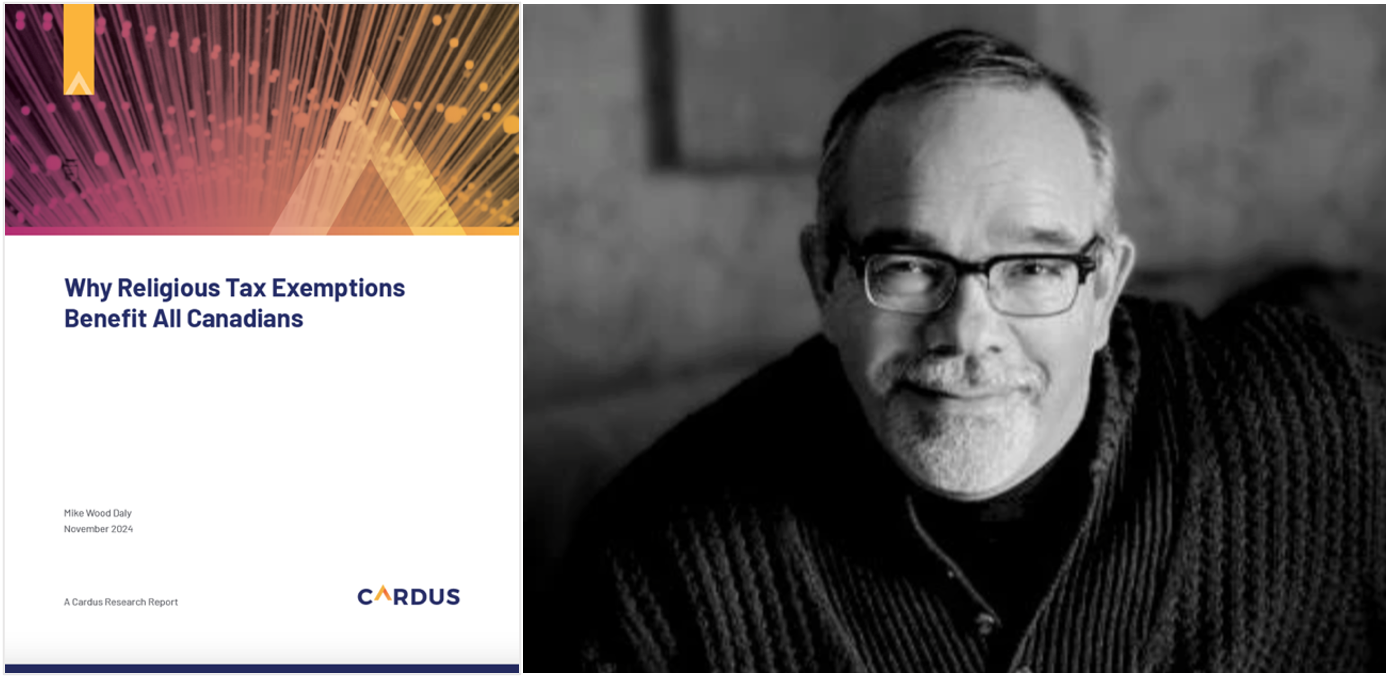
Wood then compares these concrete public benefits with the estimated gain that would accrue to Ottawa and other levels of government if churches were stripped of their charitable status. This financial windfall would include all new revenue generated by property, income and sales taxes paid on church activity as well as the savings arising from the loss of tax deductions for donors. It is a complex calculation, but using data from his 64 congregations, Wood estimates the potential tax gain at a mere $24.8 million – or $1.7 billion scaled up to the national level. Compared to the $18 billion in overall benefits mentioned above, what Wood calls Canada’s “Halo Effect” is more than 10 times as great as what churches’ charitable status costs the Canadian tax system.
There are, of course, many non-pecuniary benefits associated with religious activity. According to Statistics Canada, the country’s top volunteers are most likely to be either university graduates or actively religious. And for these religious folks, their generosity in time is not limited to promoting their own faith. As Statcan observed, such volunteers “provided the majority of their hours to non-religious organizations.” Among the other intangibles associated with the presence of a faith-inspired community is bringing people of all ages, economic circumstances and cultural backgrounds together to build relationships and foster a communal spirit. But how does one put a dollar figure on that?

It is thus the hard financial numbers that provide the strongest argument in favour of maintaining churches’ charitable status. “To be blunt, removing [this would] create a significant reduction in the capabilities of religious communities to serve the common good,” says Brian Dijkema, president of Halo Project-sponsor Cardus. “That is what is at stake here fiscally.” Focusing on the estimated $18 billion in total benefits, Dijkema adds in an interview, “So much of this money is being used to serve the common good. Yes, the parish budget pays for the priest, pays for the lights, heat and upkeep of the church building. But it also is used for actual service.” He points to Hamilton, Ontario’s Good Shepherd Centres, “one of the major organizations serving the homeless” in the area, as another example of the important work done privately by churches and religious organizations in their local areas without any fanfare.
As for the growing stridency of the anti-church movement in Ottawa, Dijkema replies, “I think it’s a failure of Canadians and Canadian politicians who do not know the facts and are choosing to promote a narrative not backed up by facts. I would encourage them to read our reports and look the real evidence in the eye.”
Is there a measurable economic value associated with religious charities?
The social policy think-tank Cardus measures the public benefits of religious communities through its Halo Project by calculating the value of churches’ direct spending plus the social services they provide and other community benefits. For every dollar a typical Canadian congregation spends, the report finds the local community receives an average of $3.39 in socio-economic benefits. Extrapolating from a sample of 64 congregations, the study estimates the total national benefit arising from all Canadian churches to be $18 billion annually. This “Halo Effect” is 10.47 times greater than the estimated $1.7 billion that their charitable status costs the Canadian tax system.
From State Neutrality to State Hostility
Given the stakes, it is worth asking where this urge to strip churches of their charitable status comes from, and who is behind it. Among the notion’s earliest appearances in Ottawa was in a 2019 Senate Special Committee report on the charitable sector. A footnote explained that “the committee received very limited testimony on what should be contained in any future list of statutory categories of charity.” That “very limited testimony” was courtesy of the British Columbia Humanist Association (BCHA), which “submitted that the advancement of religion should be omitted or ‘expanded to include (i) a religion that involves belief in more than one god and (ii) a religion that does not involve belief in a god.’”
Five years later, another BCHA submission made a much bigger splash in Ottawa, as executive director Ian Bushfield apparently convinced the Finance Committee to include Recommendation #430 in its 2025 pre-budget report. Bushfield’s contribution claimed that the absence of a provision for the advancement of “nonreligious worldviews” as a charitable activity in Canadian law should be seen as a breach of “the state’s duty of religious neutrality by showing a preference toward theistic viewpoints over nonreligious ones. It relies on a presumed public benefit of faith.” Curiously enough, the BCHA has itself been a federally registered charitable organization since 1989.
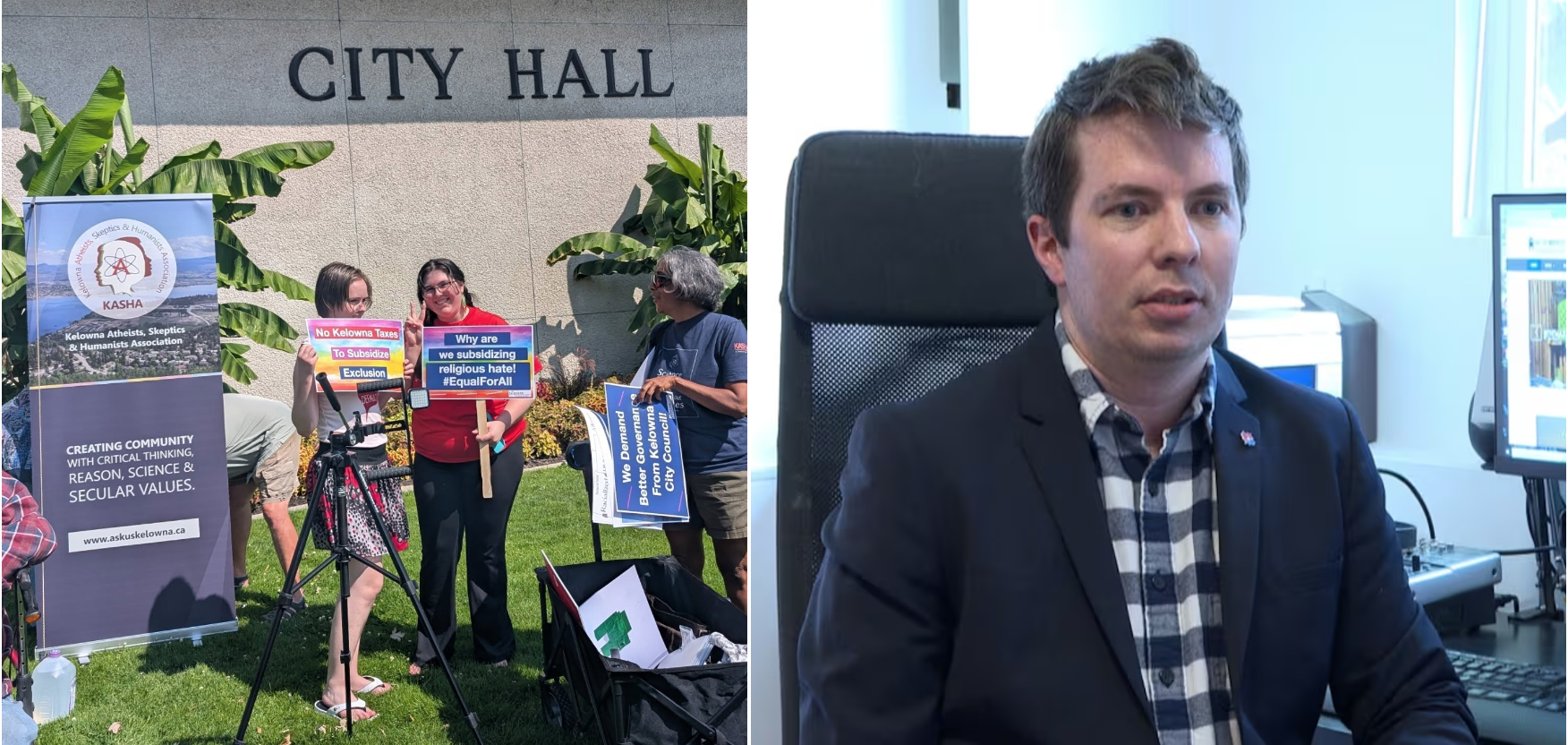
A quick glance at the BCHA website suggests its primary contribution to the public good is a concerted effort to wipe out churches and any influence they may have on society-at-large. Headlines include a call to “End Religious Institutional Objections to MAID”, to “End Public Funding of Private Schools”, and to “End the Privileged Status of Religion in Canadian Charity Law”. In July 2025, Bushfield and a “couple dozen other secularists” gathered outside city hall in Kelowna, B.C. to protest property tax exemptions for places of worship. “The increasing numbers of religiously unaffiliated individuals, driven by a move away from traditional religions, represent a society that is increasingly embracing reason, critical thinking, and individual freedom of belief,” Bushfield writes of his movement.
It bears mention that these efforts to undermine or destroy organized religion are tightly connected to, and often indivisible from, Canada’s abortion lobby. Both movements are motivated by the same sense of animosity towards a conflicting, morality-based worldview. It is worth noting that the entry immediately preceding Recommendation #430 proposes that Ottawa “no longer provide charitable status to anti-abortion organizations.” This too comes from a BCHA brief. And when the BCHA refers to “anti-abortion organizations” it means not only advocacy groups like Campaign Life Coalition or Euthanasia Prevention Coalition but all organizations that provide material support to pregnant women but do not offer or refer them for abortion, groups which include many mainline churches.
Intriguingly, the BCHA and ARCC – two tiny organizations with an apparently outsized influence in Ottawa – have collaborated to pressure the government to withdraw support, funding and tax credits even from pregnancy crisis centres.
Another such link can be found in the Abortion Rights Coalition of Canada’s (ARCC) 2018 effort to persuade Prime Minister Justin Trudeau to require a mandatory pro-abortion attestation for access to the federal Canada Summer Jobs grants program. This soon-notorious and blatantly unconstitutional attestation (which was eventually withdrawn) required not merely vetting of the immediate job being funded but that the entire organization’s “core mandate” be brought into alignment with the government’s perspective on abortion.
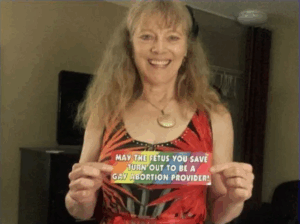
Despite this setback, ARCC executive director Joyce Arthur later attempted to expand her attack to cover the entire charitable sector. In an August 2022 letter to Trudeau and then-deputy prime minister Chrystia Freeland, Arthur wrote that the Canada Revenue Agency should “interpret existing charitable guidelines in a modernized way that recognizes Charter rights and requires charities to respect them.” The term “Charter rights” here is code for a dogmatic pro-choice stance.
Intriguingly, the BCHA and ARCC – two tiny organizations with an apparently outsized influence in Ottawa – have collaborated to pressure the government to withdraw support, funding and tax credits even from pregnancy crisis centres. Now these efforts appear to have culminated in an attempt to dismantle a centuries-old common law tradition regarding the charitable status of churches. And without any substantive public debate.
What’s Really at Stake
Throughout the modern era, Dijkema notes, spiritual and secular administrations have co-existed in a largely peaceful and cooperative manner in most Western countries, despite earthly governments holding all the real power. “What I think is fascinating is that the religious component of charitable status has been a place where the state has typically constrained itself from using its dominant power – that is, the coercive power to tax,” he says.
Yet current developments suggest that sense of acceptance is rapidly disappearing. “The ‘small l’ liberal philosophical tradition claims that the state is supposed to be neutral regarding visions of the good life,” explains Dijkema. “They are constantly telling people that you should not impose your view of the good life on others.” Yet Recommendation #430 clearly proposes a “philosophical restructuring of our state to the point where there will no longer be any space or freedom for communities and people whose vision of a good life may differ from that of the state itself. It is a deeply ill-considered move.”
Since the dawn of civilization, religion has been an indivisible component of humanity. And it is precisely when times are toughest and the people at their most vulnerable that churches have served their most important role in protecting the necessities of life.
While critics of organized religion may cackle with glee at the thought of delivering a knockout blow to churches at a time when they are at their weakest, such a strike will do far more damage that its supporters likely appreciate. Anyone concerned with social justice or equality, for example, should understand that the 2025 budget could do much more than just strip churches of their charitable status. The budget is expected to deliver a deficit of anywhere from $68 billion to as much as $92 billion, a result of soaring defence spending and the costs of Canada’s trade war with the U.S. Given that Prime Minister Mark Carney makes much of his past career as an economist, he will be under pressure to find other places to cut spending. What might that be?
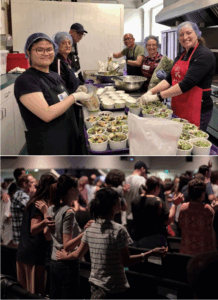
The last time a fiscally-minded Liberal government faced a similar scenario was in 1995 under Prime Minister Jean Chretien and Finance Minister Paul Martin. Then the solution was to swiftly reduce social spending, particularly by cutting transfer payments to the provinces, triggering sharp cuts to many long-standing welfare programs countrywide. As government retreated, it fell to churches and private charities to pick up the slack. There was simply no one else to turn to.
American research on the role of U.S. churches in the wake of similar 1996 welfare reforms enacted by the Clinton Administration offers compelling evidence on the scale of this effect. Are church and state substitutes? Evidence from the 1996 welfare reform is the title of a 2005 article in the Journal of Public Economics examining the role played by Presbyterian churches in the U.S. following Washington’s welfare retrenchment. The author concluded that “church activities substitute for government activities,” if somewhat imperfectly. For every $1 in federal welfare cutbacks, the author estimated there were 20¢ in new donations and/or church-provided services attempting to fill the gap. Such an effort cannot be overlooked.
Since the dawn of civilization, religion has been an indivisible component of humanity. And it is precisely when times are toughest and people at their most vulnerable that churches play their most important role in protecting the necessities of life – not just food, shelter and companionship, but spiritual guidance, grace and hope. That need is as great today as it ever has been. No one should be using tax law to dismantle organized religion.
Anna Farrow served for ten years as the director of a non-profit organization representing English-speaking Catholics in Quebec. As a journalist, she has written for numerous publications including First Things, Catholic World Report and The Catholic Register.
Source of main image: Steve Skjold/Shutterstock.





